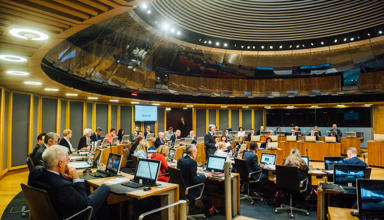
Article by Llyr Gruffydd MS, Chair of the Finance Committee
The Wales Act 2014 provided the biggest change to the Welsh settlement by devolving some tax powers and extending the Welsh Government’s borrowing powers. These powers are underpinned by the Fiscal Framework.
As we approached the end of the Fifth Senedd term, Members of the Senedd Finance Committee felt it was important to reflect on the implementation of these powers, the effectiveness of the fiscal framework and measure the awareness of devolved taxes. The Committee published its report in early February and the findings will be debated by the Senedd this Wednesday, 24 March.
The Welsh Government’s budget is approximately £18 billion a year, primarily funded through the Welsh block grant, whilst approximately 20 per cent of the budget is now funded from tax revenue, increasing the accountability of the Welsh Government to the people of Wales.
Of course the success of fiscal devolution in Wales, is the responsibility of not only the Senedd and the Welsh Government, but the UK Government. Unfortunately the Chief Secretary refused several invitations to attend Committee which means we remain unclear on the UK Government’s position on a number of significant funding issues for Wales.
Whilst fiscal devolution is still in a relatively early stage our inquiry identified a number of areas that need improving.
Money allocated by the UK Government
It is clear that the system for funding Wales is complex and lacks transparency, making it hard to achieve a clear understanding of the funding available to the Welsh Government, also making our role in scrutiny more difficult. The lack of transparency clearly leads to funding disputes, with the UK Government playing judge and jury, we think there should be an independent adjudication process to rule of disagreements between the two Governments.
In response to our report the Welsh Government fully supports increased transparency and goes even further to say the current system should be replaced by jointly-agreed funding arrangements.
Budget management tools
Whilst the Fiscal Framework provides the Welsh Government with tools to help manage resource borrowing and the Wales Reserve, we as a Committee have always considered it an anomaly, that the Welsh Government is not afforded the same end of year flexibility as a local authority – the Welsh Government needs to be able to implement strategic long term planning. Whilst we’ve seen a temporary change this year as a result of COVID, the events of the past 12 months make the case for more end of year flexibility even more pronounced.
Awareness of fiscal devolution
In April 2018, Welsh tax legislation was introduced to replace UK Stamp Duty Land Tax and Landfill Tax, Land Transaction tax and Landfill Disposal Tax. From April 2019, the Welsh Government has been responsible for setting the Welsh Rates of Income Tax (WRIT).
We were disappointed to find that awareness of devolved taxes amongst businesses, professionals and the general public is low. It is particularly concerning that most people in our survey weren’t aware of WRIT, a tax which most people are paying regularly as part of their income tax.
Of course, the WRIT has remained the same as UK rates – meaning there is no incentive for people to understand the different - but it is vital that Welsh taxpayers are aware that part of their tax is paid directly to the Welsh Government. As we approach an election, taxation will form part of manifestos and we need to make sure the Welsh public understand the powers of the Senedd.
Tax devolution mechanism
Back in 2018 the Welsh Government approached the UK Government seeking competence over vacant land tax, as we approach the end of this Senedd term competence has still not been devolved.
The Welsh Government has told us its experience to date in seeking additional tax powers is not an easy or straightforward process. Whilst we recognise the first attempt at seeking competence for a new tax is likely to take longer to iron out the process, it calls into question whether the process is fit for purpose.
Fiscal devolution is in its infancy in Wales, but our work shows how essential it is to monitor and scrutinise the processes in place. We need to make sure the processes are fit for purpose, for the Welsh Government to be able to plan spending effectively, for Members of the Senedd to scrutinise the Welsh Government, but ultimately for the Welsh taxpayer to be assured of a fair funding system for Wales, where tax revenue is delivering value for money.






